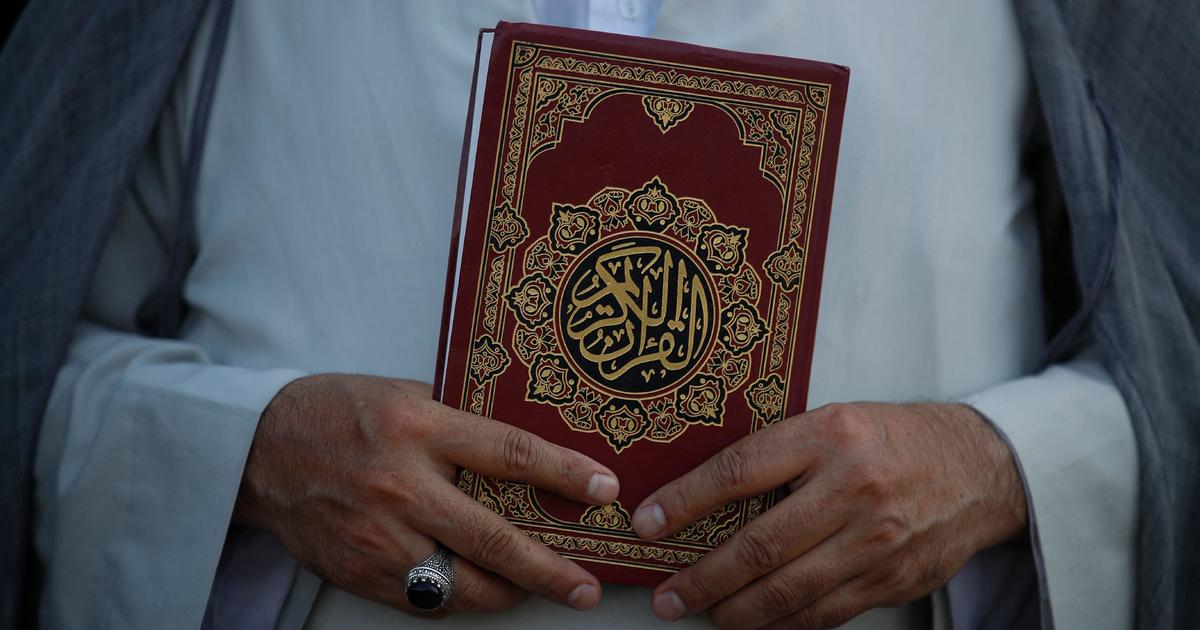Kuwait announced this week that it will print thousands of copies of the Quran in Swedish to be distributed in the Nordic country, calling it an effort to educate the Swedish people on Islamic “values of coexistence.” The plan was announced after the desecration of a Quran during a one-man anti-Islam protest that Swedish police authorized in Stockholm last month.
Kuwaiti Prime Minister Sheikh Ahmad Nawaf Al-Ahmad Al-Sabah said the Public Authority for Public Care would print and distribute 100,000 translated copies of the Muslim holy book in Sweden, to “affirm the tolerance of the Islamic religion and promote values of coexistence among all human beings,” according to the country’s state news agency Kuna.
On June 28, Salwan Momika, a 37-year-old Iraqi Christian who had sought asylum in Sweden on religious grounds, stood outside the Stockholm Central Mosque and threw a copy of the Quran into the air and burned some of its pages.
The stunt came on the first day of Eid-al-Adha, one of the most important festivals on the Islamic calendar, and it triggered anger among Muslims worldwide. Protests were held in many Muslim nations, including Iraq, where hundreds of angry demonstrators stormed the Swedish embassy compound.
CBS News sought comment from the Swedish Ministry of Foreign Affairs on the Kuwaiti government’s announcement, but did not receive a reply by the time of publication.
The U.S. State Department condemned the desecration of the Quran in Stockholm, but said Swedish authorities were right to authorize the small protest where it occurred.
“We believe that demonstration creates an environment of fear that will impact the ability of Muslims and members of other religious minority groups from freely exercising their right to freedom of religion or belief in Sweden,” State Department spokesperson Matthew Miller said. “We also believe that issuing the permit for this demonstration supports freedom of expression and is not an endorsement of the demonstration’s actions.”
The United Nations Human Rights Council adopted a resolution Wednesday condemning the burning of the Quran as an act of religious hatred. The U.S. and a handful of European nations voted against the resolution, which was introduced by Pakistan on behalf of the 57-nation Organization of Islamic Cooperation (OIC), arguing that it contradicts their perspectives on human rights and freedom of expression.



Actually you’re both generalizing too much (aka prejudicing), IMHO.
For example the largest muslim country in the World is … Indonesia. They’re pretty moderate.
Further, Islam is split in Xiites and Sunites and it’s the latter (which is the majority one in such “wonderful” places as Saudi Arabia and Afghanistan) that has the most intolerant types (though Iran is majority Xiite and its government is a pretty shit bunch of theocrats).
Generalizing either “good” or “bad” over all Muslims would be like claiming that all Christians are like the ones in the Filipines (were some the faithful will do their own version of Christ’s Via Sacra, complete with getting crucified, to show their faith) or the deep south in the US (no explanation needed ;)) or if trying to make the opposite point go all about how the handful of highly educated Lutherans in Northern Europe are so discrete and unimposing in how they practice their faith.
Really, it’s not Islam, it’s some (maybe most, maybe not) Muslims and it’s religious governments in general (plenty of examples of all religions: for example, look at the current Hindu-nationalists in India) who use religion to control the undereducated (religious belief inverselly correlates with formal education).
And @hopelessbyanxiety@lemmy.world absolutelly, people with very little education tend to be far easy to say with any old bollocks. For example, even though I have a Degree and am a city dweller, my grandmother was illiterate from a crushingly poor farmer background and she actually believed soap operas were real and got very confused when she saw the same actor is different ones. It’s nothing to do with race, it’s to do with not even having the tools to be able to understand things beyond your little local bubble (which in the case of peasents, is really small), so much more easy prey for sophisticated types in positions of authority leveraging “tradition”.
I think you’re falling into the very trap you accuse others of falling into and projecting your own life experience on the “undeveloped” and thinking they can be just as knowing as everybody else: they can’t, not because they don’t have the physical capability but because they didn’t have the opportunities you had at school to acquire the necessary tools to find and understand most information out there, so they are reliant on world of mouth to “understand” the broader world and tend to defer to people in positions of authority (like religious leaders). Even the ones who can read and write are often behind a language barrier which is often very local (just one country or even smaller) and thus unable to see beyond what the (often very controlled) local media shows them.
The baseline of knowledge and even of ability to practice strict rationality of people in the absence of a system of Formal Education is very low, and staggeringly so for those who lived their whole lives in the little village were born in, the latter of which is even most people in most countries (even so called “developed” ones) which is probably why you get most suppory for conservative and even ultra-religious politics from the countryside, not the cities (Turkey is a perfect example).
Mind you, there are plenty of other ways in which people are restricted to information bubbles (even in the English speaking world) and are unable to reason with strict logic and do actual analysis of what they hear, and those often boil down to never having been taught the tools to think in a structured, logical way or to at last do a little logic check for everything you hear, even if coming from the “right people”, hence how you end up with the plenty of supporters of moronic destructive policies, even in the “developed” countries.
I have no issues with this. I generally agree. Very well said.
glad to know you’re not generalizing, and correct me if i’m wrong but this is how i interpret your reply: some muslim people are really uneducated. Clearly these governements have no intention of educating their people (btw i can see that in a sense in my western country as well, the education system is collapsing figuratevely and physically).
My own conclusion: what you said is true, and we’ll have to see how the situation will turn out. We have no control over our own governments let alone those abroad; unless nato is going to bring peace and democracy yet again. We saw how that turned out in Afghanistan, Iraq, Lybia, and probably others that i don’t remember
Yeah, you got my point perfectly (and summarized it much more succintly than I made it ;))
It’s really not about any specific religion, it’s about access to formal education and how certain kinds of politicians in government (mainly authoritarians, but even in Democracies - like Turkey and Hungary once were) will use religion to take advantage of undereducated people who are “believers” because their parents were and society around them tells them they’re supposed to be.
I agree with you that invading a country to bring “peace and democracy” would not even work if it was done genuinelly for those and those reasons alone (people have to want those things and conquer them themselves) but even less so when “bringing peace and democracy” was just a profoundly hypocrite excuse (very much the same shit as Putin’s “freeing Ukraine of Nazis”) for nothing more than greed and dominance.
The problems of access to education and authoritarianism (anchored on religion or not) are connected and I don’t think there are easy solutions for that.